
CANADIAN ENTOMOLOGIST
Scope & Guideline
Connecting Scholars through Insect Science Insights
Introduction
Aims and Scopes
- Insect Taxonomy and Systematics:
Research aimed at identifying and classifying insect species, including descriptions of new species, taxonomic revisions, and the establishment of phylogenetic relationships among groups. - Ecology and Behavior of Insects:
Studies that explore the ecological roles of insects in various environments, their interactions with other organisms, and their behaviors in response to environmental changes. - Insect Pest Management:
Research focused on the development and evaluation of integrated pest management strategies, including the use of biological control agents and semiochemicals to mitigate the impact of insect pests. - Biodiversity and Conservation:
Investigations into the diversity of insect species and their habitats, with a focus on conservation strategies to protect endangered species and maintain ecosystem health. - Insect Physiology and Development:
Research examining the physiological processes of insects, including studies on reproduction, development, and responses to environmental stressors.
Trending and Emerging
- Impact of Climate Change on Insect Populations:
Recent publications are increasingly addressing how climate change affects insect distribution, behavior, and population dynamics, highlighting the urgent need to understand these changes for effective management. - Invasive Species and Their Management:
There is a notable increase in studies related to invasive insect species, including their ecological impacts and strategies for control, reflecting broader concerns about biodiversity loss and ecosystem integrity. - Citizen Science and Community Engagement:
Emerging research emphasizes the role of citizen science in monitoring insect populations and engaging communities in biodiversity conservation efforts, showcasing innovative approaches to data collection and public involvement. - Genomic and Molecular Studies in Entomology:
An upward trend in publications utilizing genomic tools to understand insect biology and evolution is evident, indicating a shift towards molecular approaches in entomological research. - Integrated Pest Management Innovations:
Recent articles highlight new methodologies in integrated pest management, particularly the development of semiochemical-based traps and biological control strategies, reflecting a commitment to sustainable agricultural practices.
Declining or Waning
- Historical and Fossil Insect Studies:
Research focused on fossil insects and their historical significance has seen a decline, possibly due to the increasing emphasis on contemporary ecological issues and applied entomology. - Insect Behaviour Studies:
While still relevant, the frequency of publications specifically addressing intricate behavioral studies of insects has waned, as many researchers are now integrating behavioral aspects into broader ecological or physiological studies. - Insect Pathology and Microbiology:
Research on insect pathogens and associated microbiomes appears less frequently, potentially overshadowed by more pressing topics in pest management and conservation.
Similar Journals
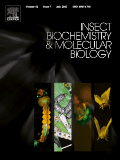
INSECT BIOCHEMISTRY AND MOLECULAR BIOLOGY
Unlocking the Mysteries of Insect BiochemistryINSECT BIOCHEMISTRY AND MOLECULAR BIOLOGY, published by Pergamon-Elsevier Science Ltd, stands at the forefront of interdisciplinary research focusing on the biochemical and molecular processes in insects. This esteemed journal, with an ISSN of 0965-1748 and E-ISSN of 1879-0240, serves as a vital resource for scientists and researchers interested in the intricacies of insect physiology and genetics. With a significant presence in the academic community, it holds impressive rankings, including Q2 in Biochemistry and Q1 in Insect Science according to the latest quartiles, reflecting its critical role in advancing knowledge in these fields. The journal's convergence of content from 1992 to 2024 illustrates its commitment to fostering long-term scholarly discourse. Researchers will appreciate its impact within the Agricultural and Biological Sciences and its contributions to understanding the molecular biology of insects. Although not an open-access journal, it provides complementary insights into the biochemistry and genetics of insects, making it indispensable for anyone keen on pushing the boundaries of entomological science.
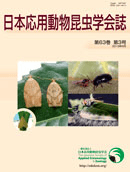
JAPANESE JOURNAL OF APPLIED ENTOMOLOGY AND ZOOLOGY
Unveiling the Secrets of Insect Behavior and EcologyJapanese Journal of Applied Entomology and Zoology is a premier publication in the field of Insect Science, offering a platform for researchers and practitioners to share their findings on applied entomology and zoology. Established in 1957 and published by the Japan Society of Applied Entomology and Zoology, this journal aims to foster the understanding of insect-related studies that impact agriculture, ecology, and biodiversity. With an ISSN of 0021-4914 and E-ISSN of 1347-6068, it serves as a crucial resource for both academics and industry professionals. While the journal currently resides in the Q4 category of the Scopus ranking for Insect Science with a percentile of 11th, it plays a significant role in providing valuable insights into insect behavior, systematics, and their ecological roles. Readers can benefit from its published research to drive innovations and solutions in pest management and conservation practices. As the journal continues to evolve, it reinforces its commitment to disseminating critical research that supports sustainable practices in entomology and zoology through its convergence extending to the year 2024.
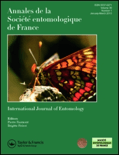
ANNALES DE LA SOCIETE ENTOMOLOGIQUE DE FRANCE
Bridging knowledge gaps in insect biology.ANNALES DE LA SOCIETE ENTOMOLOGIQUE DE FRANCE, published by Taylor & Francis Ltd, is a prestigious journal that focuses on the dynamic field of entomology, offering a platform for the dissemination of innovative research related to insect science and ecological systems. With an increasing impact factor and notable quartile rankings (Q2 in both Ecology, Evolution, Behavior and Systematics, and Insect Science), the journal serves as a vital resource for researchers, professionals, and students alike, stimulating advances in our understanding of insect biology and its implications for broader ecological contexts. Although it is not an Open Access journal, it boasts a strong reputation within the academic community, as evidenced by its significant Scopus rankings and a commitment to high-quality peer-reviewed content. With its extensive historical archive since 1988 and a continuous publication schedule through 2024, ANNALES DE LA SOCIETE ENTOMOLOGIQUE DE FRANCE remains an essential reference for those engaged in the study of entomology and related ecological fields. For more information, visit the publisher's site at Taylor & Francis Ltd.

INSECT SYSTEMATICS & EVOLUTION
Unraveling the Mysteries of Insect EvolutionINSECT SYSTEMATICS & EVOLUTION is a prestigious journal published by BRILL, which has been a vital source of scholarly information since its inception. Specializing in the fields of ecology, evolution, behavior, and systematics within the realm of insect science, this journal garners significant attention with its 2023 ranking in the second quartile across multiple categories, highlighting its relevance and impact in the field. With a focus on advancing knowledge through innovative research and reviews, it serves as an essential platform for researchers, professionals, and students alike, promoting an understanding of insect biodiversity and systematics. The journal’s accessibility options, including its Open Access policy, combined with a broad international scope, ensure that critical findings reach a diverse audience, fostering collaboration and discourse within the scientific community. Situated in the Netherlands, INSECT SYSTEMATICS & EVOLUTION maintains its commitment to excellence and strives to contribute actively to the ongoing dialogue in insect science, making it a must-read for anyone interested in the intricate world of insects.

TURKIYE ENTOMOLOJI DERGISI-TURKISH JOURNAL OF ENTOMOLOGY
Exploring the Intricacies of Insect LifeTURKIYE ENTOMOLOJI DERGISI - TURKISH JOURNAL OF ENTOMOLOGY is a distinguished journal published by the Entomological Society of Turkey in collaboration with Ege University, dedicated to advancing the field of insect sciences. With an ISSN of 1010-6960 and E-ISSN 2536-491X, this journal plays a pivotal role in disseminating groundbreaking research in entomology, particularly focusing on the diverse aspects of insect biology, ecology, and their applications in agriculture. As a member of the Q3 category in Insect Science according to the 2023 quartiles, it ranks in the 40th percentile of its field, indicating its growing influence and importance within the scientific community. The journal's scope encompasses innovative research findings, reviews, and short communications that contribute to the understanding and management of insect species. While not currently open access, it serves as a vital resource for researchers, professionals, and students seeking to stay informed about the latest developments in entomology from Turkey and beyond, with a commitment to maintaining high scholarly standards through rigorous peer review processes.
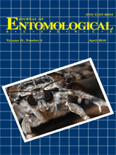
JOURNAL OF ENTOMOLOGICAL SCIENCE
Exploring the Frontiers of Insect ScienceJOURNAL OF ENTOMOLOGICAL SCIENCE, published by the Georgia Entomological Society Inc, is a crucial resource in the field of insect science and ecology. With a rich history since its inception in 1993, the journal provides a platform for innovative research and comprehensive reviews addressing various aspects of entomology. Although not an open-access journal, it is highly regarded within its community, holding a Q3 ranking in Agronomy and Crop Science, Ecology, Evolution, Behavior and Systematics, and Insect Science as of 2023. Each issue promises to contribute valuable insights to professionals, researchers, and students alike, making it an essential publication for those looking to stay abreast of developments in entomological studies. The journal's editorial commitment ensures that it remains at the forefront of entomological research through rigorous peer reviews and a dedication to scholarly excellence.

Insects
Bridging Gaps in Insect Research and ApplicationInsects is a prominent open-access journal published by MDPI, dedicated to advancing research in the vibrant field of insect science. Since its inception in 2011, this journal has become a vital resource for academics and professionals alike, also ranked in the prestigious Q1 category within the Insect Science field by Scopus, achieving a remarkable rank of 26 out of 181 journals. With an ongoing convergence period from 2010 to 2024, Insects provides comprehensive coverage of various aspects of entomology, including but not limited to ecology, behavior, physiology, and applied entomology. Based in Switzerland, the journal promotes an open-access model, ensuring that vital research is readily available to researchers, practitioners, and students globally. This journal not only facilitates the dissemination of groundbreaking entomological research but also fosters collaboration and interdisciplinary dialogue in the field.
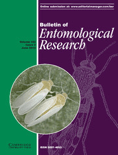
BULLETIN OF ENTOMOLOGICAL RESEARCH
Fostering Interdisciplinary Dialogues in Entomological ResearchBULLETIN OF ENTOMOLOGICAL RESEARCH, published by Cambridge University Press, is a prestigious journal that has been at the forefront of entomological research since its inception in 1910. With an impressive track record extending through to 2024, this journal serves as a vital platform for advancing knowledge in various related fields, notably Agronomy and Crop Science and Insect Science, where it ranks in the top quartile (Q2) and maintains a commendable position within the Scopus rankings in its categories. Notably, its contributions also intersect with Medicine in a broader scope, fostering interdisciplinary insights. While access to the journal content is not classified as 'Open Access,' its rigorous peer-reviewed articles are crucial for researchers, professionals, and students seeking to enhance their understanding of entomology and its applications in agronomy and beyond. The journal's impact is reflected in its notable percentile rankings, emphasizing its relevance and influence in the academic community. Located at the heart of the UK, the BULLETIN OF ENTOMOLOGICAL RESEARCH continues to be an essential resource for those dedicated to the study and understanding of insects and their impacts on agriculture and health.
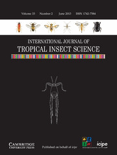
INTERNATIONAL JOURNAL OF TROPICAL INSECT SCIENCE
Advancing the Science of Tropical InsectsINTERNATIONAL JOURNAL OF TROPICAL INSECT SCIENCE, published by Springer International Publishing AG, is a leading interdisciplinary journal dedicated to advancing knowledge in the fields of insect science and ecology. With its ISSN 1742-7584 and E-ISSN 1742-7592, this journal provides a platform for researchers to publish high-quality, peer-reviewed articles that explore various aspects of tropical insect biology, behavior, and their ecological impacts. As evidenced by its Q3 ranking in both Ecology, Evolution, Behavior and Systematics and Insect Science, it plays a vital role in fostering scientific dialogue and innovation within these disciplines. Researchers affiliated with the journal benefit from its visibility and growing impact, as demonstrated by its Scopus ranks, with a percentile standing of 61st in Insect Science. Although the journal is not open access, it still reaches a wide academic audience, making significant contributions to our understanding of tropical ecosystems. Situated in Switzerland, this journal is crucial for students, professionals, and researchers invested in the intersection of entomology and ecological science.
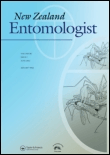
NEW ZEALAND ENTOMOLOGIST
Illuminating Insect Behavior Through Rigorous ResearchNEW ZEALAND ENTOMOLOGIST, published by Taylor & Francis Ltd, is a distinguished journal in the field of Insect Science, featuring a rich history dating back to its initial publication in 1952. As a platform for sharing innovative research and critical insights, this journal serves as a vital resource for entomologists and scientists interested in the diverse aspects of insect biology, ecology, and behavior. Although it currently holds a Q4 category in its discipline with Scopus ranking it at the 163rd out of 181 journals, the NEW ZEALAND ENTOMOLOGIST continues to uphold high-quality standards of peer-reviewed articles that contribute significantly to the understanding of insects, particularly within the unique ecosystems of New Zealand. Researchers and professionals are encouraged to submit their findings to enhance the journal's growing repository of knowledge, while students will find a wealth of information to aid their studies and foster their interest in entomological research.